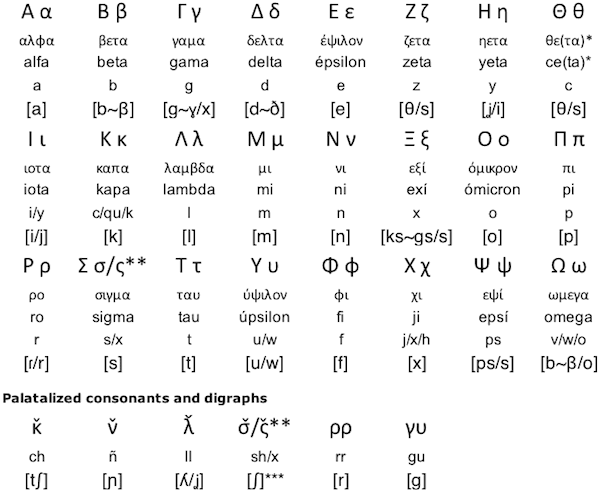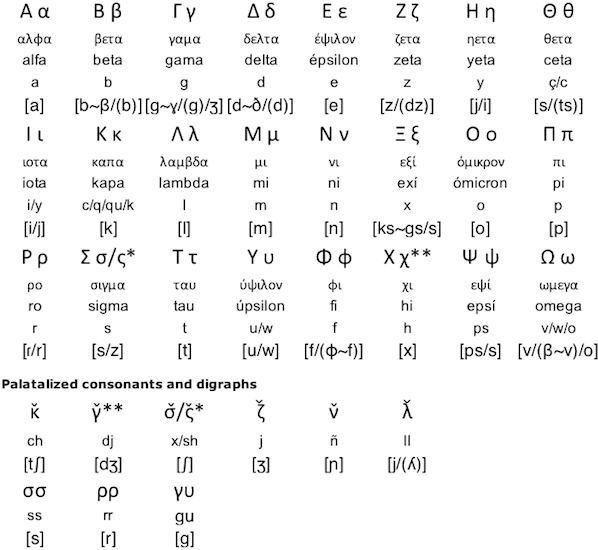Greco-Hispano (Γρεκο-Ἱσπανο)
The Greco-Hispano alphabet was created by Ángel Alexis Ayala Jiménez to write modern Spanish, Ladino, and medieval Spanish. As a native speaker of Spanish interested in dialectology and language change, Ángel began to research Ladino, the language of the Sephardim (the Jews expelled from Spain in 1492). Ladino was traditionally written in Hebrew script (usually Rashi and Solitreo) and is currently mostly written using various adaptations of the Latin script. Given the historically significant Sephardic population in Greece in cities such as Thessaloniki, Ángel became interested in adapting the Greek alphabet to Ladino and subsequently medieval and modern Spanish.
Notable features
- Type of writing system: alphabet
- Direction of writing: left to right
- Used to write: Spanish, Ladino, Medieval Spanish
- Mainly phonetic, with close parallels to etymological spelling found in modern standard Spanish orthography, as well as medieval Spanish orthography for Ladino
- Punctuation marks same as modern standard Spanish, with the exception of inverted question and exclamation marks, which are not used s
Greco-Hispano alphabet for Spanish

* 'θετα' when reciting alphabet; 'θε' in daily speech to distinguish from 'ζετα'
** in word-final position
*** as in words from foreign or indigenous languages, not Rioplatense pronunciation of /ʝ/
Diacritics
- ̆ καρόν (carón) - palatalization mark for consonants
- ΄ τιλδε (tilde) - accent mark for stress, used over vowels as in standard Spanish
- ̈ διέρεσις (diéresis) - used over υ to indicate it is pronounced [w] in digraph γυ (e.g. γϋε [gwe], γϋι [gwi])
- ʻ εσπίριτυ άσπερο (espíritu áspero) - used over vowels to indicate silent 'h' from standard Spanish; can occur together with accent mark (e.g. αἵ for 'ahí')
Notes
- For etymological reasons, both Β and Ω = [b~β]. They are used in the same way as ‘b’ and ‘v’ are in standard Spanish (Ω is also equivalent to standard Spanish ‘w’ when pronounced [b~β] in foreign words). Additionally, Ω is used to write the conjunction meaning ‘or’ and its own name ‘omega’ (= [o] in both cases).
- Γ = [g~ɣ] before [a], [o], [u], or when grouped with other consonants; Γ = [x] before [e] and [i] where standard Spanish uses ‘g’ for etymology
- ΓΥ = [g~ɣ] before [e] and [i]; the diéresis diacritic is used for sounds [gwe] and [gwi]
- Ζ = [θ] where standard Spanish uses ‘z’; elsewhere, Θ = [θ] before [e] and [i], in the same way standard Spanish uses ‘c’ before ‘e’ and ‘i; Ζ and Θ are only pronounced [θ] in dialects that maintain ‘distinción’ (e.g. northern Spain), and pronounced [s] in all others
- Λ̌ = [ʎ] and is used as ‘ll’ is in standard Spanish; pronounced [ʝ] in most modern dialects
- Except for [ʝ] pronunciation of Λ̌, Η = [ʝ]; H is also used to write the conjunction meaning ‘and’ (= [i]); H is not used to end diphthongs as ‘y’ is in standard Spanish
- I = [i] and the [j] in all diphthongs (including where standard Spanish uses ‘y’); since I is considered a vowel orthographically, note the different implementation of accentuation rules for word-final diphthongs compared to standard Spanish (e.g. ‘εστόι’ vs. ‘estoy’)
- Between vowels, Ρ = [ɾ] and ΡΡ = [r]; elsewhere, Ρ = [ɾ] or [r] according to its location in the word/syllable, like standard Spanish ‘r’
- Χ = [x], unless written with Γ before [e] and [i] for etymology; note the rough breathing (espíritu áspero) is always silent and never represents [x] as ‘h’ does for foreign words in standard Spanish (e.g. ‘χάμστερ’ = ‘hámster’)
- Ξ = [ks~gs] in native words, but is also used to write words derived from Greek (rare); in the latter case, Ξ = [s] word-initially (e.g. ‘ξιλόφονο’ = [silofono])
- Ψ is only used in words of Greek origin (rare); Ψ = [ps] within a word and [s] word-initially (e.g. ‘έψιλον’ = [epsilon], ψικιατρα = [sikjatɾa])
- Any sounds not mentioned above are represented by their phonetically equivalent letters, including sounds in words from foreign or indigenous languages
Greco-Hispano alphabet for Ladino and Medieval Spanish
Latin script equivalents based on medieval Spanish orthography, not modern romanizations for Ladino (such as Aki Yerushalayim). Letter pronunciations exclusive to medieval Spanish are in parentheses after Ladino pronunciations.

* in word-final position
** only applicable to Ladino
Diacritics
- ̆ καρόν (carón) - palatalization mark for consonants
- ´ τιλδε (tilde) - accent mark for stress, used over vowels as in modern standard Spanish; Ladino 'vos' conjugations ending in ς̌ with stress on the last sylable also carry an accent (e.g. 'vos havlásh' = 'ωος ἁωλάς̌')
- ¨ διέρεσσις (diéressis) - used over υ to indicate it is pronounced [w] in digraph γυ (e.g. γϋε [gwe], γϋι [gwi])
- ʻ εσπίριτυ άσπερο (espíritu áspero) - used over vowels to indicate silent 'h' from modern standard Spanish (used if silent in Ladino, but may be pronounced [h] in medieval Spanish); can occur together with accent mark (e.g. αἵ for 'ahí')
Notes
- The adaptation of Greco-Hispano for Ladino and medieval Spanish is primarily phonetic in nature. However, for etymological reasons, it also maintains certain distinctions that have been lost in speech (especially in Ladino). These conventions closely parallel the modern standard orthographies of other Iberian languages, such as Portuguese (e.g. Mod. Port. ‘cabeça’, ‘fazer’, ‘passear’, ‘casa’, ‘geral’, ‘haver’).
- Unlike modern Spanish, B and Ω contrast phonetically in both Ladino ([b~β] vs. [v]) and medieval Spanish ([b] vs. [β~v]). Additionally, Ω is used to write the conjunction meaning ‘or’ and its own name ‘omega’ (= [o] in both cases).
- Γ = [g~ɣ/(g)] before [a], [o], [u] or grouped with other consonants; Γ = [ʒ] before [e] and [i] where modern and/or medieval Spanish uses ‘g’ for etymology (follow modern Spanish conventions for Ladino); see notes above on modern Spanish for use of ΓΥ (= [g] in medieval Spanish) and diéressis
- Z = medieval Spanish [dz] (= [z] in written Ladino, as in ‘ἁζερ’ = [azeɾ])
- Θ = medieval Spanish [ts] (= [s] in written Ladino, as in ‘κοραθόν’ = [koɾason])
- Except for Ladino pronunciation [z] for Z and [s] for Θ, ΣΣ = [s] between vowels, Σ = [z] between vowels and before/after voiced consonants, and Σ = [s] elsewhere (e.g. ‘πασσαρ’ = [pasaɾ], ‘κασα’ = [kaza], ‘μισμο’ = [mizmo], ‘σαωες’ [saves])
- Λ̌ = medieval Spanish [ʎ] (= [j] in written Ladino, as in ‘ελ̌α’ = [eja])
- Except for Ladino [j] pronunciation for Λ̌, H = [j] when initiating a syllable and between vowels (e.g ‘ηο’ = [jo], ‘ρεηες’ = [rejes]); H is also used to write the conjunction meaning ‘and’ (= [i]); elsewhere, I = [i] and [j] (see notes above on modern Spanish for effects of I on accentuation)
- Ζ̌ = [ʒ], unless written with Γ before [e] and [i] for etymology
- See notes above on modern Spanish for use of P, PP, Ξ and Ψ
- The rough breathing diacritic (espíritu áspero) is used to denote the silent ‘h’ from modern standard Spanish (= [h] in early medieval Spanish); it is not used in Ladino for writing specific dialects that pronounce [f] in its place (= Φ).
- Any sounds not mentioned above are represented by their phonetically equivalent letters, including sounds in words from foreign languages
Download alphabet charts for Greco-Hispano (Excel)
Sample text in Spanish (Greco-Hispano alphabet)
Τοδος λος σερες ὑμανος ναθεν λιβρες ε ιγυαλες εν διγνιδαδ η δερεκ̌ος η, δοταδος κομο εστάν δε ραζόν η κονθιενθια, δεβεν κομπορταρσε φρατερναλμεντε λος υνος κον λος οτρος.
(Αρτίκυλο 1 δε λα Δεκλαραθιόν Υνιωερσαλ δε Δερεκ̌ος Ὑμανος)
Transliteration (Latin alphabet)
Todos los seres humanos nacen libres e iguales en dignidad y derechos y, dotados como están de razón y conciencia, deben comportarse fraternalmente los unos con los otros.
(Artículo 1 de la Declaración Universal de Derechos Humanos)
Translation
All human beings are born free and equal in dignity and rights. They
are endowed with reason and conscience and should act towards one another
in a spirit of brotherhood.
(Article 1 of the Universal Declaration of Human Rights)
Sample text in Ladino (Greco-Hispano alphabet)
Ελ γ̌υδεο-εσπαν̌ολ, γ̌ιδιό, γ̌υδεσμο ο λαδινο ες λα λινγυα ἁωλαδα πορ λος σεφαρδιμ, γ̌υδίος αρρονζ̌αδος δε λα Εσπαν̌α εν ελ 1492. Ες υνα λινγυα δεριωαδα δελ καστιλιανο η ἁωλαδα πορ 150 000 περσονας εν κομυνιτάς εν Ισραελ, λα Τυρκιηα, αντικα Ηυγοσλαωια, λα Γρεθια, ελ Μαρροκο, Εσπαν̌α η λας Αμέρικας, εντρε μυνκ̌ος οτρος.
Sample text in Ladino (Latin alphabet, medieval-based spelling)
El djudeo-español, djidió, djudesmo o ladino es la lingua havlada por los sefardim, djudíos arronjados de la España en el 1492. Es una lingua derivada del castiliano y havlada por 150 000 personas en comunitás en Israel, la Turquiya, antica Yugoslavia, la Grecia, el Marroco, España y las Américas, entre munchos otros.
Translation
Judeo-Spanish, djidio, djudezmo, or Ladino is the language spoken by Sephardi Jews expelled from Spain in 1492. It is a language derived from Spanish and spoken by 150,000 people in communities in Israel, Turkey, the former Yugoslavia, Greece, Morocco, Spain, and the Americas, among many others.
Sample Ladino text adapted from samples in following Wikipedia pages:
https://en.wikipedia.org/wiki/Judaeo-Spanish
https://es.wikipedia.org/wiki/Idioma_judeoespa%C3%B1ol
Constructed scripts for: Ainu |
Arabic |
Chinese languages |
Dutch |
English |
Hawaiian |
Hungarian |
Japanese |
Korean |
Lingala |
Malay & Indonesian |
Persian |
Tagalog / Filipino |
Russian |
Sanskrit |
Spanish |
Taino |
Turkish |
Vietnamese |
Welsh |
Other natural languages |
Colour-based scripts |
Tactile scripts |
Phonetic/universal scripts |
Constructed scripts for constructed languages |
Adaptations of existing alphabets |
Fictional alphabets |
Magical alphabets |
A-Z index |
How to submit a constructed script
[top]

You can support this site by Buying Me A Coffee, and if you like what you see on this page, you can use the buttons below to share it with people you know.

If you like this site and find it useful, you can support it by making a donation via PayPal or Patreon, or by contributing in other ways. Omniglot is how I make my living.
Note: all links on this site to Amazon.com , Amazon.co.uk
, Amazon.co.uk and Amazon.fr
and Amazon.fr are affiliate links. This means I earn a commission if you click on any of them and buy something. So by clicking on these links you can help to support this site.
are affiliate links. This means I earn a commission if you click on any of them and buy something. So by clicking on these links you can help to support this site.
[top]



, Amazon.co.uk
and Amazon.fr
are affiliate links. This means I earn a commission if you click on any of them and buy something. So by clicking on these links you can help to support this site.